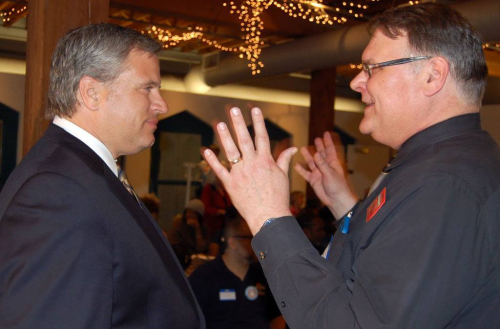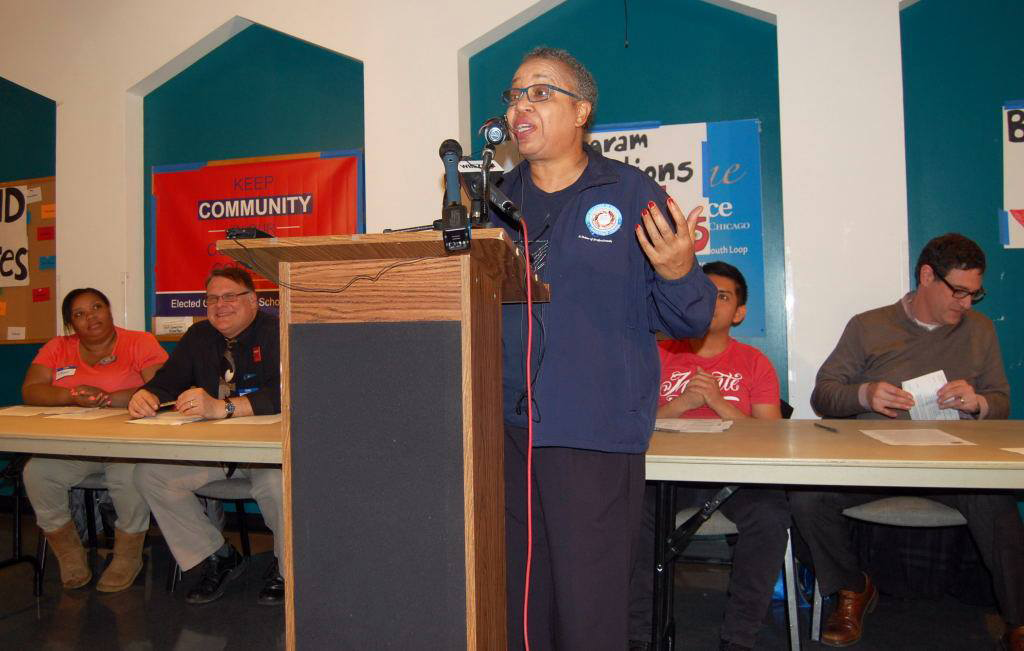On March 28, nearly two hundred people convened at Grace Church in the South Loop for a town hall sponsored by the Alliance of City College Unions. At the City Colleges Community Town Hall, union representatives, teachers, faculty, and students spoke out against City Colleges of Chicago’s Reinvention Initiative. They had two goals for this town hall: an elected board for City Colleges of Chicago, and city council hearings on City Colleges’ program relocation policy. But their overarching goal, as their slogan states, is to “keep the community in community colleges.”
The Alliance of City College Unions (ACCU) is a collaboration between multiple community college labor groups in the Chicago area: the Cook County College Teachers’ Union (CCCTU) Local 1600, representing full-time faculty, professionals, and security staff working at community colleges in Chicago and its suburbs; CCCTU Local 1708, the union for clerical and technical personnel; the City Colleges Contingent Labor Organizing Committee (CCCLOC), representing adjunct faculty and librarians; and Service Employees International Union (SEIU) Local 73, representing custodial staff.
Tony Johnston, president of CCCTU Local 1600, called the town hall a success. One of ACCU’s goals for the town hall was to have elected officials attend and hear the concerns of City Colleges teachers, students, and union representatives.

“Testimony was very heartfelt and, I think, very encouraging, as far as the need for elected officials to get involved,” Johnston said over the phone after the event. Aldermen Scott Waguespack, John Arena, and Nicholas Sposato, and State Representatives Robert Martwick, Cynthia Soto, and Will Guzzardi all attended the town hall. Representative Martwick introduced House Bill 4312, legislation that would create an elected board for City Colleges of Chicago, to the Illinois House of Representatives, and Representatives Soto and Guzzardi are co-sponsors on the bill.
House Bill 4312 passed the Illinois House Committee on Higher Education on April 20, thirteen to one, with bipartisan support. The bill has had a second reading, but several notes on the bill have prevented it from having the third reading required before the bill can be debated and voted on. Representative Martwick believes that these notes were created to “slow down the process.” Calling an elected board “a right that is supposed to be guaranteed under our system of democracy” in an emailed statement, he said he believes that the measure will be voted on and passed in the Illinois House by May.
House Bill 4312 is analogous to House Bill 577, the bill to create an elected school board for Chicago Public Schools. Much like Chicago Public Schools is the only school district in Illinois without an elected school board, City Colleges of Chicago is the only community college system in the state without an elected board. Instead of the current sevenmember board, the board would be composed of twenty members, each representing a unique district, and a board president elected at-large. It would have the same powers and responsibilities as the current appointed board of trustees.
Johnston described the need for an elected City Colleges board in terms of accountability. “Accountability…is a term that’s being used quite a bit towards us from administration. We think also that they should be held accountable for their decisions,” he said. “And essentially [now], they are accountable to no one but the mayor, because the mayor appoints them.”
He went on to point out that almost none of the members of the current board have a background in higher education. Looking at bios for the current City Colleges board of trustees, aside from the chair of the board, most board members have backgrounds in business or politics.
“We are merely asking for democracy in education: let communities vote for who makes decisions at these public community schools (that’s what a ‘community’ college should be),” said Michael Held, CCCTU Local 1600 representative for Daley College, in an emailed statement.
The ACCU’s push for an elected school board started last October. According to Held, “The town hall was only one piece to a larger strategy to stand up for our communities and students.”
Other actions by the ACCU include many tabling sessions, which Held describes as “informational picketing,” where union representatives inform people on the issues facing City Colleges and encourage people to support their petition demanding policy change.
The ACCU’s March 28 town hall also highlighted three policies that the unions believe harm students and faculty: program relocation, a part of City Colleges’ College to Career program; changes to the tuition schedule; and a new model of advising. These policies are all a part of the Reinvention Initiative, started in 2010 by Chancellor Cheryl L. Hyman. The initiative is supposed to “drive greater degree attainment, job placement, and career advancement” according to the City Colleges website.
During the town hall, Johnston stated that Reinvention has harmed communities. “Ever since 2010…that connection with our neighborhoods, with our communities, has been weakened,” he said, according to a video recording of the event. “The city college administration has instituted policies that limit access to college,” he continued.
Students, educators, and union representatives have said that the proposed program relocation under Colleges to Careers has limited access to college. The program assigns a career designation to each college in the network. Before, each college had classes in every field. Once the College to Career program is fully implemented, students looking to study information technology will have to attend Wright College, and students looking to study auto-tech will have to take classes at Olive-Harvey. Manufacturing will be moved to Daley; hospitality to Kennedy-King; healthcare to Malcolm X; business to Harold Washington; and education, human and natural sciences to Truman.
According to Johnston, many students can’t make the cross-city trip to take classes at the college that they have been designated to. The movement of education and child-development programs to Truman College in Uptown will hurt many students on the South and West Sides, where all of these programs will be closed. “Many of them just simply cannot make that trip up to Truman,” he said.
Held added that the location of some College to Careers programs perpetuates racial and class segregation in Chicago. “It appears the programs for blue-collar and service jobs are offered on the South and West Sides (transportation at [Olive-Harvey]; manufacturing at Daley; hospitality at [Kennedy-King]), while the higher-income potential programs are north (business at [Harold Washington]; computer tech at Wright; education at Truman).”
Kathryn Hayes, the District Director of Communications for City Colleges said in an emailed statement that movement of programs reflects “the reality that our students may have to travel across the city to secure a desired employment opportunity.” She added that City Colleges has created a shuttle bus system to provide free rides between colleges.
Speaking about the implication that the proposed locations of programs replicates class and racial segregation, Hayes stated that students in fields like transportation and manufacturing could have higher starting salaries than they would with an associates degree in a field like business or education, due to changes in the field. “Technology has radically changed many industries and it is important to shed outmoded career stereotypes.”
Speaking at the town hall, T’Juana Seay, a Daley College student majoring in early childhood education and a mom with a fulltime job, put a human face to that problem. She stated that because of her obligations as an employee and a mom, the commute to Truman would make continuing her education almost impossible. She also questioned Daley College’s designation as the center for Advanced Manufacturing, saying “We should only have manufacturing jobs in our community? That’s not right for us.”
A second Reinvention program, which changed the tuition schedule, also disadvantages some City Colleges students in a way that Johnston claims ignores the reality of City Colleges’ student population. The new tuition schedule gives students a discount for full-time enrollment, making part-time attendance more expensive. However, as Johnston stated, “The vast majority of our students are part-time. They have other commitments: family, they have jobs.”
Additional concerns of the ACCU include an unresponsive administration and the fact that adjunct faculty are going on their fourth year without a collective bargaining agreement. Johnston blames the “intransigence of the administration” for the lack of negotiations and said, “The administration has chosen not to hear our concerns….They are not listening to the concerns not only of us but of the community and of the students.”
Representatives of the ACCU and Representative Martwick hope that an elected City Colleges board of trustees will help address these concerns. “I’m not gonna go out and say that all of our problems are gonna go away with an elected school board,” said Johnston. “But at least it gives a voice to the community in Chicago.”
Update 4-28-16, 9:36am: This article has been updated to reflect a comment from the City Colleges of Chicago. The Weekly received this comment after the story originally went to print.



